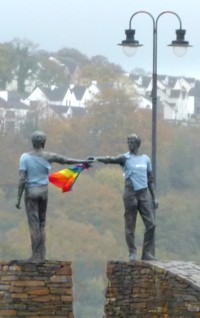Kinsale
Before leaving Australia we had already discovered that we would be unable to competitively match the Waterford accommodation in more expensive Cork. The nearby seaside town of Kinsale seemed better value. We were not disappointed.
Kinsale is a charming seaside town and up-market fishing village in bay surrounded by steep sides, reminiscent, on a larger scale, of Port Isaac, where the TV series 'Doc Martin' is filmed. It's overlooked by Victorian mansions on one hillside and by an ancient fort, now a (closed) wine museum, set below St Joseph’s Convent of Mercy on the other. It's a popular holiday destination and has the appropriate infrastructure, including a shopping precinct of appropriately cute shops, restaurants and bars with some pretty, healthy, and quite precipitous, walks to work off unwanted calories. The convent didn't seem to be inhabited and has seen better days. I later discovered that like a number of Church institutions in Ireland it's closed and is now scheduled for redevelopment.
See the Ireland Album - Click Here...
One of the town's claims to fame is assisting in the rescue of 761 survivors from the Cunard ocean liner RMS Lusitania that was torpedoed by a German U-Boat on 7 May 1915 off the Kinsale headland. Many of the 1,198 killed were Americans and this contributed to the United States entering the Great War. Whether or not it was the prime cause, an intercepted German telegram to Mexico probably had more to do with it, the 'Lusitania outrage' was used in recruiting posters in America and to explain the sudden US involvement in the war to a previously equivocal public.
While conspiracy theorists and crime/adventure novelists have suggested more elaborate sinking scenarios, Kapitänleutnant Walther Schwieger, commanding U-20, noted the time and place of sinking in his log, adding that he declined to fire a second time in view of all the people in the water. This has since been verified from German archives and from the wreck itself.
Three kilometres around Summer Bay from the town is Charles Fort a well preserved 17th century fortification commanding the bay. It's built over an earlier fortification built during the Battle of Kinsale. It brought this battle to my attention. It was the final battle/siege in the Tudor Conquest of Ireland (see the history above...).
In 1601 the Spanish landed a force of 4,000 at Kinsale in support of the Irish Ulster chieftains opposing the forces loyal to Elizabeth I with whom the Spanish were still at war. The Tudor army responded by surrounding the town and besieging it. Despite some initial bloody skirmishes the Catholic Irish forces were unable to help the Spanish break the Tudor siege. Over three months the Spanish were subjected to withering bombardment, during which Elizabeth's forces improved their fortifications making a Spanish victory impossible. Eventually the Spanish accepted this inevitability and surrendered. They were then allowed to sail away. The Spanish would probably have succeeded had they not lost half their troops, weapons and ammunition, when, yet again, God, in the guise of the weather, had favoured Elizabeth's 'purified religion'. Enough was enough. The Spanish would never again intervene in Ireland and the Ulster forces were obliged to return to their home provinces. The last of them surrendered to the Tudors in 1603.
In March 1603 Elizabeth I died and James I ascended the British throne. James immediately proposed that the 15 year long war with Spain should end. The Spanish, for their part, had poured vast resources into fighting both the English and the Dutch to no avail. Now that the hated and annoyingly victorious Elizabeth was gone they responded positively, signing the '1604 Treaty of London' (there are several others with different dates), under which Spain formally recognised the English Church and foreswore its intention to re-establish the Church of Rome in England.
In return the British withdrew State support to the Dutch Protestants and allowed Spanish ships to use English ports, giving them a base from which to attack the Dutch. But that all fell apart when three years later the Spanish treasury was declared bankrupt and the Dutch were victorious. Thus the Battle of Kinsale marked an important step in the demise of the greatest super-power the modern world had yet seen.

